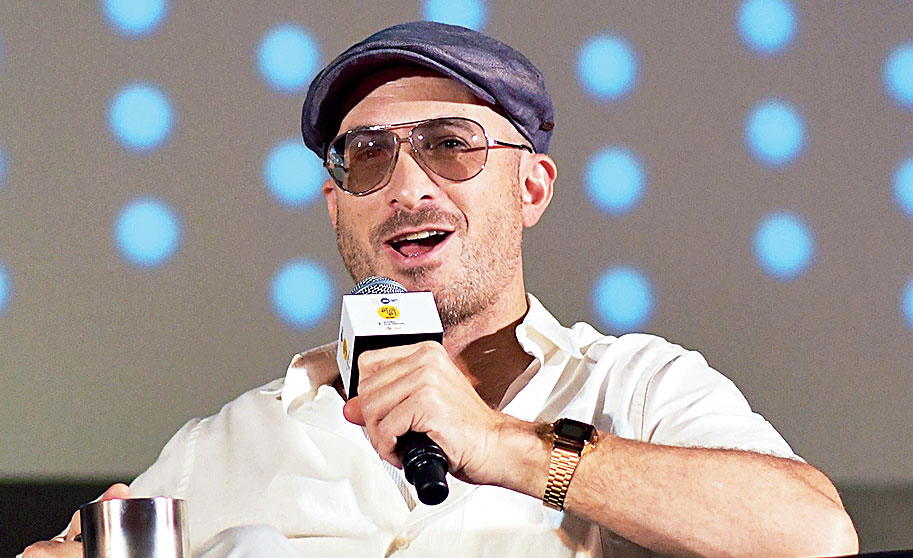He’s been to India five times before, and this time he decided to check out Dharavi, the biggest slum of Mumbai, and the local dive bars. “It’s been two days in Mumbai. Yesterday, I went and met a swami and then went to Dharavi… I just walked around and met some people. Last night, I ate some awesome food and had drinks at a dive bar called Gokul in Colaba. It’s just two blocks from the hotel,” Darren Aronofsky tells us, before settling down for a quick chat at the iconic Taj Mahal Palace hotel in Colaba, before leaving for the masterclass.
Ushnota Paul: Mother! was like a Bunuel-esque allegory, full of biblical metaphors. How much of an influence does Luis Bunuel’s avant-garde surrealism have in your films?
There’s Bunuel’s film The Exterminating Angel (1962) that I always loved. His idea was that people get stuck in a room and you can examine the entire world in that one room. And I was thinking of a way of talking about something that’s happening on a planetary level and how can we sort of understand it. That kind of triggered the idea of reducing the entire Earth to a single home — because they’re both homes, you know? Earth can be called home and a house is a home.
Ushnota Paul: Mother! is also apparently inspired from this book called The Giving Tree. Where else did you draw inspiration from while writing it?
So many things. The Giving Tree is a children’s book which is about a tree that gives up everything to a little boy. That was kind of a similar metaphor for what we were doing with Mother!. The Exterminating Angel was an influence, the Bible was an influence... I don’t know if there was anything direct that was an inspiration. You end up realising that these things were related to it.
Ushnota Paul: Is filmmaking for you a way of release, like a cathartic experience?
I kind of imagine a cathartic experience being something that happens in an instant, a moment. But making movies takes years and years. There are moments in it that are cathartic, but most of the time it’s just a lot of hard work and well-earned sleep.
Ushnota Paul: Extreme close-ups, really wide shots… these are some of your signature styles. What’s the idea behind it?
I think it’s different for each film and where it comes from. Basically, each movie has its own kind of language, own set-up, own pay-off… we try to figure out a different language for each movie.
Ushnota Paul: The editing of Requiem for a Dream is a masterclass in itself, with the split-screen...
The split-screen came to me while reading the book. I realised that there were two different stories happening in one scene and that just gave me the idea. I thought it’d be cool to see the same scene from two different points of view.
Ushnota Paul: You’ve spoken about how you’re deeply influenced by Akira Kurosawa and Federico Fellini. What do you like about their styles?
Well, there have been many influences. It’s not such a small list. Each movie I make has different influences. When I talk about Fellini and Kurosawa, that was just probably two of the early filmmakers I stumbled upon when I was a film student. What I like about them is that they’re totally different stylistically. They’re both complete masters. And there’s so much to appreciate about them.
Ushnota Paul: You studied direction at the American Film Institute and your senior thesis film, Supermarket Sweep (1991), went on to become a National Student Academy Award finalist. Why is that and your other short film Protozoa (1993) not available anywhere online?
These were films made as a student. They’re not available, but maybe… someday (laughs).
Ushnota Paul: To make your debut feature film Pi (1998), you collected money from your relatives. Did you pay them all back after the movie made it to Sundance Film Festival?
Yeah, when we made the money, there was a night where we sat down and signed all the cheques — I think there were about 60 cheques. And then we sent them out to everyone!
Ushnota Paul: While making it, did you expect that Pi would end up winning the Directing Award at the 1998 Sundance Film Festival?
No, never. I mean look, yes, we always had dreams. I didn’t know that day would come... it really was a dream come true.
Ushnota Paul: This is your sixth trip to India. What do you like about the country?
So many things. You know, I often come after I have been directing because when you’re directing you’ve to be worried about so many things and be in control of everything. And then you come to India, you cannot control anything… you cannot even control how to cross the street (laughs). You sort of somehow surrender to the flow of humanity. So, I like to come to India with a backpack and just get lost.... I love movies, but I’d rather wander around India and see what I find.











